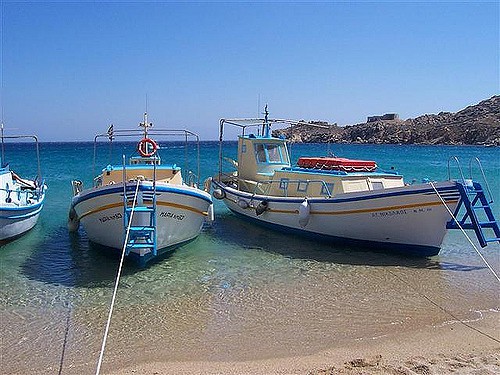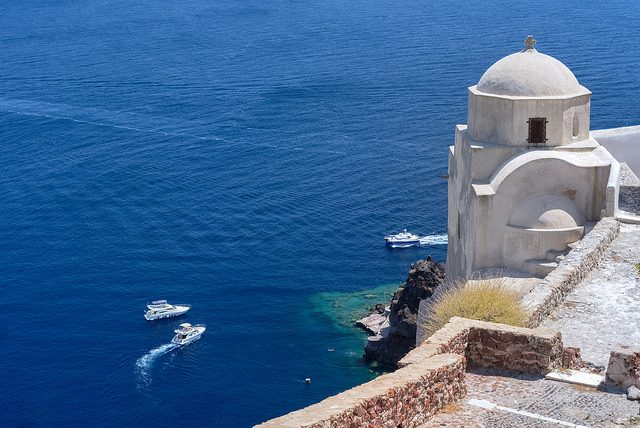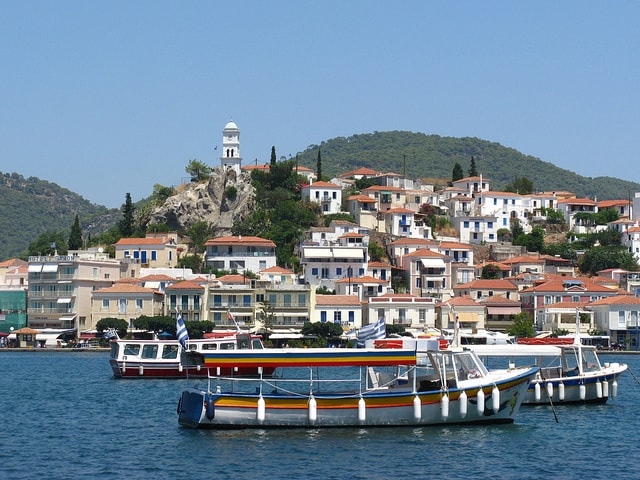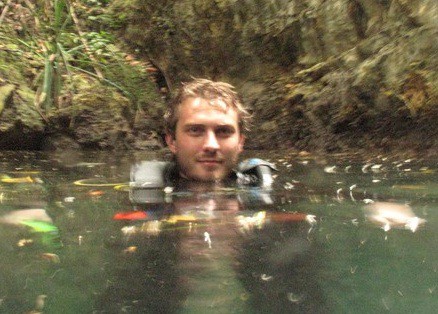
If you have dived in Greece before, please share your experiences: Dive spots you would recommend, which Dive Center you used, Fishes & Diving, Visibility, Currents, etc. Please post your comments in the section below, by doing so you will help fellow divers to plan their next trip


Before 2006, diving in Greece was very limited. Government regulations restricted scuba diving to just a small portion of the total coastlines. At that time the Greek government held the belief that the only reason for scuba diving was to steal antiquities from the sea floor.
The EU felt that the restrictions on scuba diving were hindering tourism and therefore was in violation of EU agreements. The Greek government modified their rules and, except for some special sites, opened the doors of Greece to scuba divers. Since the lifting of restrictions, the sport of scuba diving is becoming widespread in Greece.
As scuba diving is gaining in popularity, it is taking root in additional areas. Greece still has strong antiquities laws, so if you find something interesting underwater, you can look, but not touch!

Boats on Mykonos by Diego
In this page you will find more detailed information about scuba diving in Greece.
Table of contents
Best Dive Review
There are over a dozen major dive destinations in Greece and many more just making their name known internationally. The biggest names right now are Chios, Mykonos, Santorini, and Crete. Here is a sample of a few of the dive sites:
- Chios Island: This island is just off the coast of Turkey. The advance diver will find vertical walls, caverns, and numerous shipwrecks. The beginner diver will also have some shallow ships wrecks, but will also be able to see fantastic underwater formations, reefs, and experiences outstanding visibility.
- Dragonisi Island Caverns, Mykonos: The caverns are an underwater photographer’s dream. Great visibility and strong lighting bring a three-dimensional depth to stunning rock formations and the marine life. Monk seals are often found here and will drop by to see what the divers are doing.

Scuba Dive Santorini, Greece. Photo by Desousa.
- Nea Kameni, Santorini: The volcanic substrate is one of the highlights here and gives the area its name, which roughly translates to New Volcano. The Santa Maria wreck, lava tubes, caverns, and caves are all a part of the diving.
- The Caves, Santorini: Once you get underwater, you will see why they call this area “The Caves”. Indeed, there are a number of caves, but also a number of swim-throughs, caverns, and canyons for the recreational diver. If you love caves, you can even stay in one overnight as there are some accommodations offered!
- Prasonisia, Mykonos: One of the best diving sites in Greece, and also among those that the Greek government was trying to keep scuba divers out of. Indeed, the seabed here is not only the home of modern shipwrecks but also where antiquities are easy to find.
How to dive Greece?
Scuba diving is easily done in Greece with any dive center. In fact, shore diving is very common in the Greek Islands. Plus, most dive sites that are out in the blue are only a quick boat ride away, so still close to shore!
Furthermore, traveling between neighboring islands in Greece is generally easy. Thus, depending on the length of your trip, you should be able to do a few destinations if you wish to! Plus, despite the fact that there are no known major liveaboard boats in Greece, you can find small diving cruises to charter!
Best time to dive in Greece
You can scuba dive year-round in Greece, with the best time being from May to November. Also, June, July, and August are the peak tourism months and the best diving conditions.
Many divers recommend diving in May, October, and November saying overall it is the best time for a dive vacation. The reasons are simple: prices are lower, fewer crowds while ashore and diving conditions are still outstanding. Note that depending on the month, water temperatures might require a slightly heavier wetsuit.
Top liveaboards in Greece according to divers reviews
Dive courses
Generally speaking, good visibility, warm waters and no currents make Greece a great place to learn how to dive. Moreover, the number of wrecks lends to the need for a wreck diving certification. Thus, if you are not already certified, you may consider taking the wreck diver specialization course during your Greek dive vacation.

Poror Greece by Tilemahos Efthimiadis
Scuba Diving conditions
The scuba diving conditions in Greece vary mostly with the seasons. First, the coldest water temperature averages 15°C/59°F in February. Then, the range goes between 18.5°C/63°F and 26°C/79°F during the dive season (summer). Lastly, the highest water temperature averages 28°C/81°F and is found during the month of August.
Moreover, visibility can vary greatly on sites close to shore and cities. Plus, near a port, you are most likely to encounter less marine life and noises from cruise ship traffic. Otherwise, the offshore sites can have visibility over 40 meters.
Snorkelling in Greece
Greece has many great beaches and dive sites that are done as shore dives. Also, most of these sites are free of marine currents, making them great for snorkeling.
Fishes and Coral
The waters around Greece have most of the marine diversity found in the Mediterranean. Plus, the eastern end of the Mediterranean has many invasive species from the Red Sea.
As stated before, the summer months see warmer water and better conditions, which draws in more marine life. Indeed, divers will notice an increase in the number of turtles, sharks, and marine mammals during the summertime!
Diving Safety
If you are planning an upcoming dive trip or travelling to Greece, it is a really good idea to invest in travel insurance for scuba diving, because you never know what could happen and when you might need it (because accidents do happen!). I recommend this diving insurance as they offer worldwide coverage and focus on providing scuba divers a quality insurance and medical assistance service.
Greece is a new destination for many divers and has to compete with the Red Sea, a long-established and popular diving destination. Slowly the number of dive shops and diving destinations is increasing, bringing alive the scuba diving industry in Greece. So, now would be a good time to explore Greece as your next dive destination.
Photos Greece
Travel Guide
Now that you know all about the underwater world, you might want to start planning your scuba holiday! Check out our Greece Travel Review for information about how to get there, activities and excursions, where to stay, and more.

 Destinations
Destinations









Greece is definitely a very interesting place for wreck divers. It has the highest concentration of wrecks in its waters, and every year new ones are discovered. The best place for me is Leros island in the Dodecanese island group. Due to a fierce battle during World War 2, the sea bottom around the island is more like an under water museum, telling the story of the Battle of Leros. Landing vessels, planes, bombers, barches, platforms, anti-submarine nets, and the wreck of the famous Greek destroyer “the Queen Olga” have found their resting place their at a depth between 16 and 50 meters. You can do more than 10 different wreck dives here. And the island offers everything that you expect from Grrek islands: Great hospitality in numerous accomodations, pittoresque little ports, great food, but no mass tourism on Leros. For divers and non-divers a super place to spend a holiday.
Hi Carolina,
First, I’d like to thank you for reading Divezone, and for taking the time too leave your review of diving in Greece here! Plus, what a nice, informative and useful review! Thank you!
I’m sure I’ll help divers decide which of the amazing Greek islands to discover!
Best bubbles, always!
I have been diving in Greece for many years and it is a great diving destination…if you know where to go. Since the lifting of restrictions in 2006, around 200 dive centers have sprung up like mushrooms, and whilst the regulatory framework with regards to safety standards is very good, not all dive areas offer the same quality diving. With quality diving I mean the attraction under water and a small number of divers in the water. In house dive centers (i.e. on the premises of a hotel) are not particularly common and house reef diving is extremely rare (actually I know of only one dive center on Samos Island offering house reef diving). Dives are thus typically executed from boats. The diving conditions are generally very good, with visibilities between 20 and 40 m and rarely with any significant currents. Wind can be an issue, especially in the month of August and on the Cycladic Islands.
I would say that there are around 10-15 dive areas with really good dive sites, that would also appeal to experienced and well-traveled divers. In the north of the Ionian island of Kefalonia, for example. You find some excellent wrecks, sweet water caverns/caves similar to the Mexican Cenotes and a very diverse underwater fauna. The island of Leros is a wreck divers` paradise. Little known, it is a small Truk Lagoon at a fraction of the price. Samos Island is reachable with direct flights from many European cities and offers a perfect combination of diving, swimming, nature and historical sightseeing. It also features the only (in-house) dive center in Greece jointly operated by a highly experienced and diver-oriented EU-based dive trip operator. The beautiful island of Naxos also offers some great dives, with an attractive ship wreck and a (rare) Beaufighter in excellent condition. The area off Cape Sounion in the greater Athens area has a number of wrecks, notably the “SS Patris”, a paddle steamer that sank in 1868 and is still in astonishingly good condition. The south coast of Crete is little explored and dives sometimes have expeditionary character. These are only some examples that come to mind. If you avoid the highly touristic islands in high season, you will typically be diving in a small group of 6-10 divers. A real treat, if you think of the mass-diving in the Red Sea.
Diving in Greece is fascinating. Although Greece is not famous for mantas or sharks, the aquatic life is very interesting. Dolphins and Tunas are quite often around and most of encouters are with Groupers, Scorpionfishes, Moray Eels, Rays, Lobsters, lots of smaller groups of fish, Nudibrands and lately Lionfishes and species immigrating from the Red Sea.
What really make Greece interesting for diving is the wild morphology of the sea bed. You will mostly find drop-offs, deep walls, caverns and canyons.
Diving in Greece is also very safedue to the lack of currents and dangerous species, which makes the water a perfect place for all levels and idial to start diving or develop tech diving.
It is a fast growing destination suitable for all!
Hello Anastasios!
I simply wanted to thank you for reading Divezone and for the great insight you have provided above!I’m glad that you seem to be having a blast diving in Greece!
Safe bubbles!